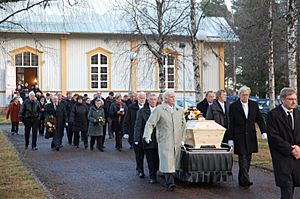Problem of induction facts for kids
The problem of induction is a big question about how we know things. It asks why we believe the future will be like the past. For example, if the sun has risen every day, why do we expect it to rise tomorrow? This idea of guessing what will happen based on what has happened before is called "inductive reasoning."
A Scottish thinker named David Hume first wrote about this problem in the 1700s. He said that even though we all use inductive reasoning, there's no perfect way to prove it's always right. This made people think hard about how we decide what is true.
Long before Hume, ancient thinkers in Greece (the Pyrrhonists) and India (the Cārvāka school) also wondered about this. They questioned if we could truly trust our guesses about the future.
Many people thought that all scientific rules and everyday ideas could be proven true through some kind of reasoning. But it was hard to find a way to prove that inductive reasoning always works. Some, like Karl Popper, even said that science doesn't use induction to prove things. Instead, he thought science makes guesses (hypotheses) and then tries to prove them wrong.
Contents
What is the Problem of Induction?
When we use inductive reasoning, we watch things happen many times. Then, we guess that the same thing will happen again. For example, if you see a woman walk her dog by the market at 8 AM every Monday, you might guess she will do it next Monday. You might even think she always walks her dog there on Mondays.
But here's the tricky part:
- Even if you see her do it many times, you can't be absolutely sure she will do it next Monday. She might be sick or go on vacation.
- David Hume said we can't even say it's "more probable" (more likely) because that still means we assume the past predicts the future.
Think about a chicken on a farm. A farmer feeds the chicken every day. The chicken learns to expect food when it sees the farmer. But one day, the farmer might not bring food; he might wring its neck instead. This sad story shows that even strong expectations based on past events can be wrong.
Old Ideas About the Problem
Some of the earliest questions about induction came from ancient Greek philosophers called Pyrrhonists. One of them, Sextus Empiricus, said that if you try to prove a general rule by looking at specific examples, you have a problem.
- If you look at only some examples, your rule might be wrong because of the examples you missed.
- If you try to look at all examples, it's impossible because there are too many.
So, he thought, induction can't be proven.
In ancient Indian philosophy, the Cārvāka school also doubted if we could gain true knowledge from guessing. They said it's hard to prove that one thing always leads to another.
Even in the Middle Ages, thinkers like al-Ghazali and William of Ockham wondered about this. They connected it to God's power. How can we be sure the world will keep working as expected when God could change it at any moment?
David Hume's View
David Hume is the most famous philosopher who talked about the problem of induction. He wrote about it in his book An Enquiry concerning Human Understanding. Hume explained that there are two kinds of knowledge:
- Relations of ideas: These are things we know just by thinking, like math problems (2+2=4). They are always true.
- Matters of fact: These are things we learn from experience, like "the sun is hot." We learn about them by seeing how causes and effects are linked.
Hume said that we can't figure out causes and effects just by thinking. We learn them by seeing things happen together many times. He called this "constant conjunction." For example, if you always see fire (cause) and then feel heat (effect), you link them together.
But here's Hume's main point: We can't prove that what happened in the past will happen in the future. Just because fire has always been hot doesn't mean it will be hot tomorrow. We can't use a perfect, certain argument to prove this.
Hume said that deductive reasoning (like math) gives us conclusions that are definitely true. But inductive reasoning (like guessing the future) only gives us conclusions that are probably true. We expect the future to be like the past because our minds automatically imagine it will be. It's not based on pure logic.
Hume didn't say we should stop using induction. He just wanted to show that it's different from certain logic. He wanted people to think about how much we rely on these guesses. The big problem is that if you try to prove induction is valid, you often end up using induction itself! For example, saying "induction has worked in the past, so it will work in the future" is an inductive argument. This makes the argument circular.
Nelson Goodman's New Riddle
Nelson Goodman came up with a new way to think about the problem of induction in his book Fact, Fiction, and Forecast. He created a made-up word: "grue."
Imagine something is "grue" if:
- It looks green before a certain time (let's say the year 2050).
- And it looks blue after that time.
Now, think about all the emeralds you've ever seen. They are all green. So, you would guess that all emeralds are green, even after 2050.
But what if someone used the word "grue"? Based on all the green emeralds you've seen (which are also "grue" before 2050), they might guess that all emeralds seen after 2050 will be blue!
This is the "new riddle." Both guesses seem to come from the same observations, but they lead to different ideas about the future.
Goodman suggested that the words we use (like "green" or "grue") affect what we expect. "Green" seems simpler to us because we've always used it. But if we grew up using "grue" and "bleen" (blue before 2050, green after), then "green" would seem strange and complicated.
Some thinkers, like W. V. O. Quine, say we should only use words that describe "natural kinds" – real properties of things. For example, emeralds are green because of their chemical makeup. They are a type of green beryl stone, made green by tiny bits of chromium. If you changed their structure, they wouldn't be green anymore. This is a reason why they are green, not just an observation.
See also
- A priori and a posteriori: How we know things before or after experience
- Abductive reasoning: Making the best guess
- Bayesian inference: Using probability to update beliefs
- Hasty generalization: Jumping to conclusions too quickly
- Law of large numbers: What happens when you do something many times
 | Dorothy Vaughan |
 | Charles Henry Turner |
 | Hildrus Poindexter |
 | Henry Cecil McBay |



